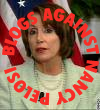Byron York on Bush & Surveillance on National Review Online
"The solid legal basis for the administration’s surveillance program."
"EDITOR’S NOTE: On Monday, when Wisconsin Democratic Sen. Russ Feingold introduced a resolution to censure President Bush, he said, "When the President of the United States breaks the law, he must be held accountable." Bush, Feingold continued, "authorized an illegal program to spy on American citizens on American soil and then misled the Congress and the public about the existence and the legality of that program." Although few Democrats have joined Feingold's call for censure, nearly all of them agree with Feingold's contention that the surveillance program is illegal. But the president's adversaries overlook the solid legal basis for the administration's actions outlined in Byron York's recent article on a little-known court decision in a matter called In re: Sealed Case." National Review
This is a must read article by Byron York of National Review regarding what proponents call "terrorist surveillance" and opponents refer to as "domestic spying."
York covers the process of how the administration came to the legal conclusion that it is in a presidents right, nay, duty in protecting the U.S..
In re: Sealed Case, is according to York is what "has become one of the key documents in the hottest argument in Washington today." It revolves around the meeting that was the birth of the NSA surveillance of al Qaeda suspects. Lawyers and three federal appeals-court judges met to "argue" the case for the program. The judges "made up what is known as the FISA Court of Review," which was created by the Foreign Intelligence Surveillance Act. Between 1978 and this meeting in September '02, the Court of Review had never had reason to meet.
For further detail read the article that covers the necessity of meeting with the Review Courts clarify and make sure there was a legal basis for the "three-way collision between the executive, legislative, and judicial branches."
ListingDeMediacratNSA SurveillanceIslamofascismWar On TerrorDomestic SpyingFISA Court of Review
"How did it come to pass that an opposition's measure of a president's foreign policy was all or nothing, success or "failure"? The answer is that the political absolutism now normal in Washington arrived at the moment--Nov. 7, 2000--that our politics subordinated even a war against terror to seizing the office of the presidency." - Daniel Henninger - WSJ 11/18/05
------------------------------------------------
------------------------------------------------
"the slovenliness of our language makes it easier for us to have foolish thoughts." - George Orwell
------------------------------------------------
------------------------------------------------
Wednesday, March 15, 2006
Byron York on Bush & Surveillance on National Review Online
Posted by a.k.a. Blandly Urbane at 12:38:00 PM
Byron York on Bush & Surveillance on National Review Online
2006-03-15T12:38:00-07:00
a.k.a. Blandly Urbane
Subscribe to:
Comment Feed (RSS)





















